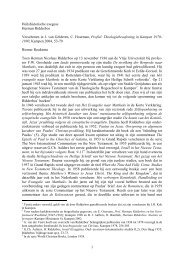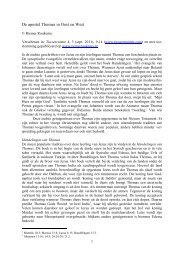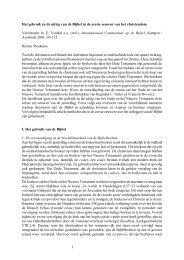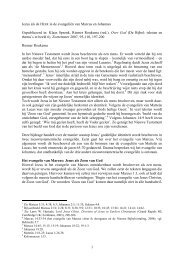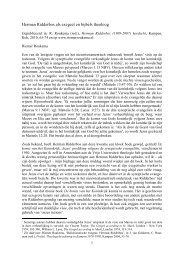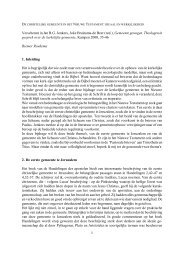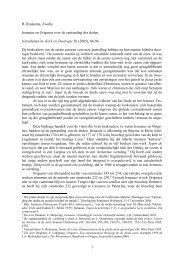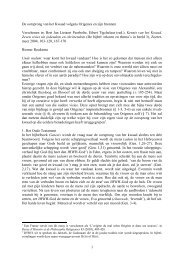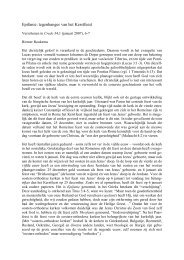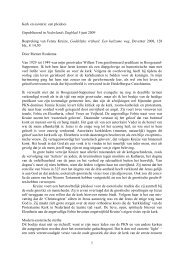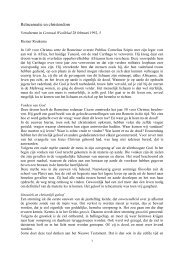Herman Ridderbos‟s Redemptive -historical ... - Riemer Roukema
Herman Ridderbos‟s Redemptive -historical ... - Riemer Roukema
Herman Ridderbos‟s Redemptive -historical ... - Riemer Roukema
You also want an ePaper? Increase the reach of your titles
YUMPU automatically turns print PDFs into web optimized ePapers that Google loves.
great change of the aeons has taken place. The center of history is in Christ‟s<br />
coming, in his victory over the demons, in his death and resurrection” (xxviii).<br />
After two chapters on the Old Testament, Judaism, and John the Baptist,<br />
Ridderbos describes in chapters 3 to 7 in what sense the kingdom of heavens had<br />
arrived with Jesus‟ coming according to the Synoptic Gospels. The titles of some of<br />
his paragraphs are: The Wicked One Overcome, Jesus‟ Power to Work Miracles,<br />
Speaking in Parables, The Delay of the Judgment, The Servant of the Lord, The<br />
Kingdom and the Cross, The Gospel of the Poor, Remission of Sins, The Fatherhood<br />
of God, The Fulfillment of the Law, The Application of the Demand of Love.<br />
Ridderbos not only speaks of fulfillment here, but also of its provisional character.<br />
To him, „[t]he kingdom has come, and yet the fulfillment is in abeyance‟ (106).<br />
Chapter 8 is devoted to the coming of the kingdom and the church. In<br />
contrast to liberal exegetes, Ridderbos assumes that Jesus‟ sayings about the church<br />
in Matthew 16:18-19 and 18:15-17 are authentic (334-42). He rejects the idea that<br />
Jesus expected the imminent full arrival of God‟s kingdom and that the first Christians<br />
were disappointed about its delay. We see, therefore, that Ridderbos‟s redemptive-<strong>historical</strong><br />
view leaves room for the church as intended by Jesus.<br />
In chapter 9, which discusses the coming of the kingdom and the Lord‟s<br />
Supper, he argues that “the specific redemptive-<strong>historical</strong> significance of this Supper<br />
is not to be sought primarily in the eschatological perspective disclosed by Jesus, but<br />
much rather, in connection with Jesus‟ expiatory death” (416). He does not regard<br />
the Lord‟s Supper as a resurrection meal, but as a sacrificial expiatory meal of which<br />
Good Friday is the focal point (431-2).<br />
Finally, in chapter 10 he gives a detailed discussion of the Naherwartung<br />
(i.e., the imminence of the Kingdom) as observed in the New Testament. Ridderbos<br />
recognizes that the Synoptic Gospels contain “direct eschatological pronouncements”<br />
by Jesus that seem to suggest the imminent coming of the kingdom (e.g.<br />
Matthew 10:23; Mark 9:1; 13:30). Exegetes such as Schweitzer have taken those<br />
texts seriously and deduced from them that Jesus was mistaken as regards the<br />
imminent general arrival of God‟s kingdom. To Ridderbos, the idea that Jesus could<br />
have been mistaken is out of the question. With reference to Cullmann and others he<br />
emphasizes that Christ‟s death and resurrection have brought the preliminary fulfillment<br />
of the coming of the Kingdom of heavens, followed by a “time of grace”<br />
which will last until the parousia. His conclusion is that Jesus did not try to give the<br />
impression that he would come back soon, but that a longer term was possible, or at<br />
least that he did not indicate a specific time (514-6; 523).<br />
It is clear from Ridderbos‟s reflections on this issue that he found it difficult<br />
to do justice to the passages that seem to suggest an imminent end. The term<br />
“redemptive-<strong>historical</strong>” is conspicuously absent from the final chapter.<br />
With hindsight it can be maintained that he gave a reliable picture of the<br />
theology of the Synoptic Gospels as regards their view of the future. To Ridderbos,<br />
however, the theology of the Synoptics largely matches Jesus‟ own preaching.<br />
Ridderbos was aware of the view that when Jesus‟ preaching was committed to<br />
writing the experiences of the early Christian church were incorporated, but he<br />
rejected it.<br />
8



